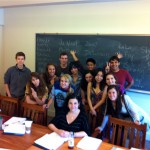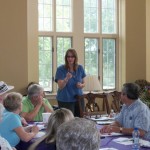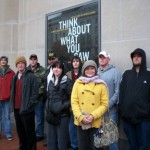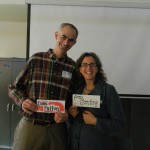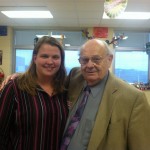Becoming a Holocaust Educator
Forums › 2023 Summer Seminar › Becoming a Holocaust Educator 2023 Summer Seminar Responses: due JUNE 18 (or earlier) › Becoming a Holocaust Educator
-
AuthorPosts
-
-
June 18, 2023 at 5:05 pm #31881
I took heart in reading about how other teachers initially felt they didn’t feel fully qualified to teach the Holocaust, for a variety of reasons. I have felt that way, too. Once the teachers pushed through those feelings and accepted that “the more you learn about the Holocaust, the more questions you have,” the teaching and learning flowed.
My problem now is, I no longer have my own classes. I used to be an English teacher, and am now the school librarian. While I do collaborate with ELA and History teachers on teaching the Holocaust/genocide/social justice, my role/time in that is limited. I’m at a CTE school, where students spend half of the school year in academic classes, and half in their vocational programs. It’s so hard to do anything in depth.
I do, however, have another role that has just begun. I am part of a team of teachers hired by the Massachusetts Dept. of Elementary and Secondary Education to design and deliver PD on helping middle and high school teachers engage their students in civic action projects. A couple of years ago, a new state law went into effect requiring students to participate in a civic engagement project once at the middle school level and once more at the high school level. The law was signed during the pandemic, so implementation didn’t begin in earnest until now. So I read with interest Diane Williams’ chapter “Student Voices Empower a Community” and was inspired by her work. It planted some seeds of ideas I can bring to the work the Civic Engagement team will be doing this summer.
I also connected with Robert Hadley’s chapter. I grew up Christian and also knew very little about Judaism. My “Al” was a guest speaker who visited my school a couple of years in a row before he passed. He was a Jewish American veteran who had participated in the liberation of a camp. His stories and photos he had taken at the time made history come alive. We all, students and staff, were very deeply moved. Students had so many questions; more than there was time to ask. I’ll never forget one story he told about how he found prisoners alive but emaciated. He and some other servicemen gave them chocolate and other foods, which for some turned out to be deadly. The prisoners had been starved for so long, that nourishment had to be done very slowly and carefully. Students brought up his stories throughout the year and I have no doubt those stories live on today.
-
-
AuthorPosts
- You must be logged in to reply to this topic.
Recent Replies
Recently Active
-
Active 1 hour, 30 minutes ago
-
Active 18 hours, 5 minutes ago
-
Active 18 hours, 17 minutes ago
-
Active 23 hours, 47 minutes ago
-
Active 1 day, 14 hours ago
- View All Members

